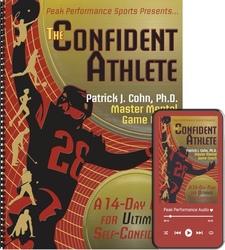
A Positive Mindset Helps to Perform Better
Do you view self-talk as something you can control? Do you think self-talk has any impact on performance?
Imagine how you would feel if your parents told you that you had no chance of winning because you were competing against a “more talented” opponent before the start of a competition.
Would those words affect your confidence? Imagine your coach yelling at you in the middle of a competition after a mistake. Would you still be motivated to push hard?
Most athletes feel hurt by negative comments, which detracts from their performance. Outside messages can hurt performance, but internal messages or self-talk are even more impactful.
When your self-talk becomes judgmental, confidence drops, performance declines, and feelings about yourself become negative.
Let’s go back to our earlier scenarios and make one slight adjustment. Imagine if YOU told yourself that you had no chance of winning before the start of the competition.
For example, “I can’t beat her. She is so much better than me. She crushes me every time I compete against her. She is a record-holder and the best athlete in the state. I am going to lose.”
How would those self-messages affect your confidence? Do you think you would be motivated for the challenge? When you put yourself down, especially before the start of a competition, you give your opponent a huge advantage.
Most likely, you will buy into those internal messages and perform poorly.
Do Not Focus on the Negatives
Now, imagine YOU berated yourself in the middle of a competition. Would that motivate you to keep fighting? If you were tired and told yourself, “I can’t finish,” would that message help you find a boost of energy to finish strong?
The messages you send to yourself are directions for your body to follow.
When you tell yourself you are tired, you will feel worn down and back off the effort. When you are critical of yourself after a mistake, you will feel unmotivated and not take risks needed to get back on track.
The key to enhancing performance or overcoming mistakes is to change the tone and content of your messages.
The following is a tremendous example of the positive impact of self-talk. US Olympic skier Jessie Diggins won the silver medal at the 2022 Beijing Olympics after finishing second in the 30-kilometer freestyle skiing event.
The night before the event, Diggins came down with food poisoning. In the morning, she struggled to keep food down. Diggins could easily have bailed on her event or attempted to finish.
And midway through the event, Diggins began cramping with approximately 45 minutes remaining in the race. Tired, cold, hungry, and hurting, Diggins gave herself positive messages to keep pushing onward.
DIGGINGS: “I was like, ‘Oh, boy,’ I was drinking, and I kept trying to put down more sugar. I focused on the parts of my body that did feel good, and I had to give myself pep talks.”
Diggins utilized positive self-talk throughout the race to keep herself focused and motivated.
DIGGINS: “I felt like the whole world was helping me get up those hills said. I just kept thinking, ‘I’ve got to keep pushing as hard as I can. I can’t back down.’ . . . That was so hard. But it was so special.”
At the finish line, Diggins collapsed on the snow. Diggins won the silver medal by giving herself positive directions, “I just kept thinking, ‘I’ve got to keep pushing as hard as I can. I can’t back down.”
You will not stop the flow of messages that pass through your mind. However, when you can focus on helpful and supportive messages, you will push forward during tough moments in competition.
How to Create Positive Self-Messages
Start by being more aware of your negative self-talk. Write each statement down on paper just like you are thinking the message. Next, rebut or reframe each negative message. Create a new message, such as:
“I hate this event and never perform well here.”
You can change your self-talk by giving yourself a pep-talk using positive statements such as “Keep pushing.”
Related Sports Psychology Articles
- How Self-Talk Can Help You Rebound
- Improve Self-Talk to Reach Your Peak Performance
- Positive or Negative Self-Talk. Which One Do You Use?
*Subscribe to The Sports Psychology Podcast on iTunes
*Subscribe to The Sports Psychology Podcast on Spotify
Download a free sports psychology report to improve your mental game!
Learn more about our one-on-one mental game coaching.
The Confident Athlete

“The Confident Athlete” consists of 2 audio programs that include 14 days of confidence fueling exercises and a simple to follow workbook that guides you through the 14 days, helps you apply the strategies, and customizes the exercises to your personal needs.
Let me help you put a stop to the confidence leak. You can learn to have greater levels of confidence in competition than you do in practice by identifying the specific ways you undermine your own confidence and how to convert your practice confidence into COMPETITIVE CONFIDENCE.
“The Confident Athlete” is a ground-breaking system to teach you how to think like a champion and have ultimate self-confidence every time you step on the playing field, court, track, or course. The confident athletes was developed for any athlete – junior to professional –that wants to gain confidence. However, coaches and sports parents can learn how to teach others to perform with ultimate confidence. Use my program if you want to bust a slump or just wanting higher or more consistent levels of self-confidence.
